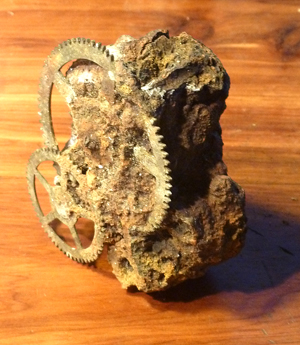
The Principality of Wy has been intrigued by the recent discovery of a strange mechanism embedded in a rock found washed up at the base of its wild sea crags. The court of Wy has been made aware that there exists an historical precedent for this discovery.
In 1902 an archaeologist was examining the finds from the detritus of a Roman cargo ship wrecked off the Greek island of Antikythera and observed that one of the pieces of rock had a gear wheel embedded in it. He at first believed it to be an astronomical clock but after much debate academics decided that it was too complex to have been constructed during the same period as the other fragments that had been discovered. It is believed that it was being taken to Rome together with other treasures looted from the Greek island of Antikythera to be displayed at a triumphal celebration initiated by Emperor to be, Julius Caesar.
The mechanism appeared to be a machine designed to predict celestial events according to the theories current in its day. This is a unique relic of brilliant Greek engineering and one of the surviving wonders of the Hellenic world. Consisting of bronze coaxial spindles, superior planet gears, fixed input gears, slot gears, offset axes and epicyclical gearing, it is a work of pure genius.

The recent exciting Wy discovery, which measures 8cm across, similarly has gear wheels embedded in it. It seems, from comparison that it is less complex than Antikythera however and as the rock is very dense the true mechanical nature of the relic is yet to be ascertained.
This machine was found in the sand. Truly this was the sand of time. Is this remarkable visitor a reminder of the ephemeral nature of all things? The scientist in us wants to find out how it works. The poet says. Leave it as it is, It is beautiful.
Is it just possible that ancient Greeks visited Wy? The Prince has a reverence for the Golden Age and would like to think so. Then again it may have a more recent provenance. Research is continuing.
Equerry
